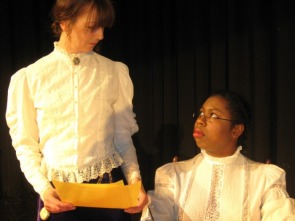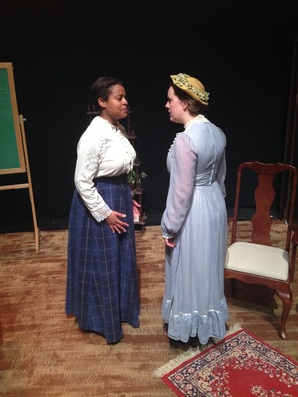Mason-Dixon
Paperback
eBook (EPUB)
eBook (PDF)
Kindle

Bennett College Production
- 2017 The Victorian Players, Youngstown, OH.
- 2015, Middlebury College, VT.
- 2014, University of Louisville's 20th Anniversary of their African American Theatre Program, Louisville, KY.
- Fourth Annual Juneteenth Festival, Univ. of Louisville, KY.
- National Finalist, Lambda Literary Awards in Drama (The Second Coming of Joan of Arc and Other Plays, HerBooks, Inc., Santa Cruz, CA)
- Finalist, San Francisco Playwrights Center DramaRama Festival.
- Reviewed in Lesbian Review of Books, Altadena, CA.
- Winner, Portland State University’s New Voices Competition, OR.
- NTM Productions, Ashland, OR.
“… complex and painful subtleties of racism...” --Lithiagraph, Ashland, OR.
 Middlebury College production
Middlebury College production
Mason-Dixon explores the complex relationship between a Black woman and a white woman, who loved each other as children, were separated at puberty, and who find themselves at mid-life divided by race, class, and politics.
As a plantation owner’s daughter, Elizabeth was “given” an enslaved child, Mary, who was her same age. The two girls grew up together, loving each other as sisters and sharing their resources. At puberty, Elizabeth was sent to a private boarding school, and it was thirty years before she was to see Mary again, by then a free woman teaching in a Black school in Philadelphia.
When the play opens, Elizabeth is demanding that Mary recognize their former friendship. Mary, now an angry Black separatist, is not so eager to reclaim the past. Elizabeth has become a spy for the Union army, and in what she sees as the ultimate gesture of reconciliation, offers Mary the “opportunity” to gather intelligence by working as a maid at the Confederate White House.
Mary, repudiating Elizabeth’s claims of sisterhood, reveals that she was sexually molested by Elizabeth’s father. She is shocked to discover that Elizabeth was also his victim. The women struggle with issues of race, class, and gender oppression as they alternately challenge and deny the great love they once had for each other. The play is based on the true story of Elizabeth Van Lew and Mary Bowser.
2 women
35 minutes
Single set
As a plantation owner’s daughter, Elizabeth was “given” an enslaved child, Mary, who was her same age. The two girls grew up together, loving each other as sisters and sharing their resources. At puberty, Elizabeth was sent to a private boarding school, and it was thirty years before she was to see Mary again, by then a free woman teaching in a Black school in Philadelphia.
When the play opens, Elizabeth is demanding that Mary recognize their former friendship. Mary, now an angry Black separatist, is not so eager to reclaim the past. Elizabeth has become a spy for the Union army, and in what she sees as the ultimate gesture of reconciliation, offers Mary the “opportunity” to gather intelligence by working as a maid at the Confederate White House.
Mary, repudiating Elizabeth’s claims of sisterhood, reveals that she was sexually molested by Elizabeth’s father. She is shocked to discover that Elizabeth was also his victim. The women struggle with issues of race, class, and gender oppression as they alternately challenge and deny the great love they once had for each other. The play is based on the true story of Elizabeth Van Lew and Mary Bowser.
2 women
35 minutes
Single set
